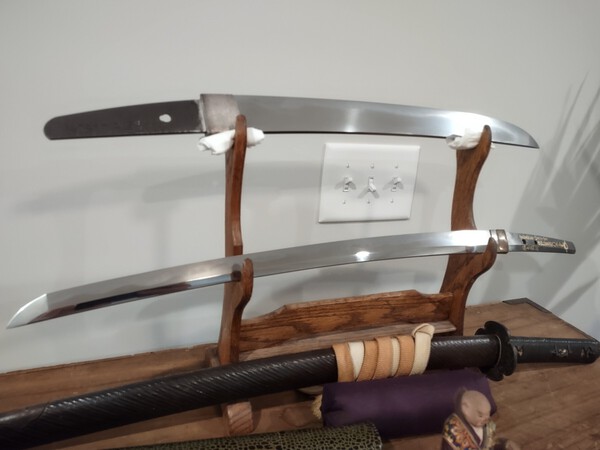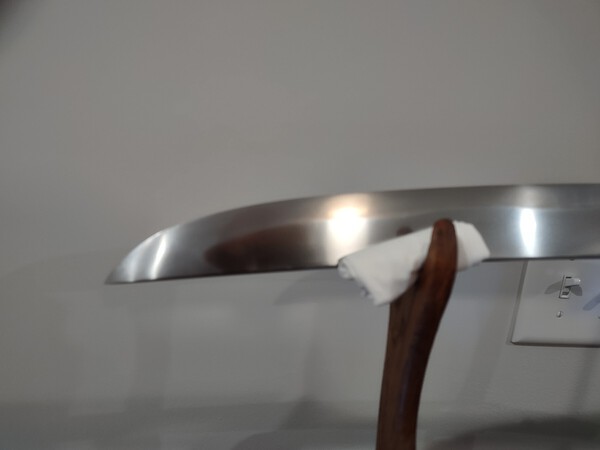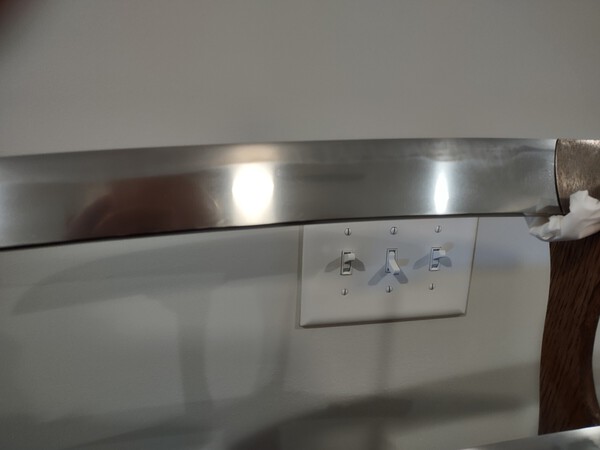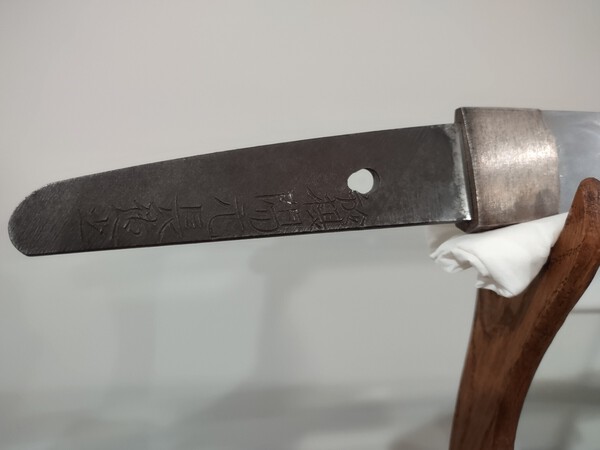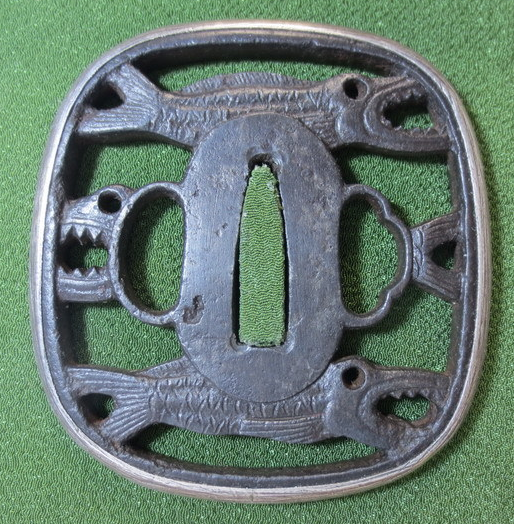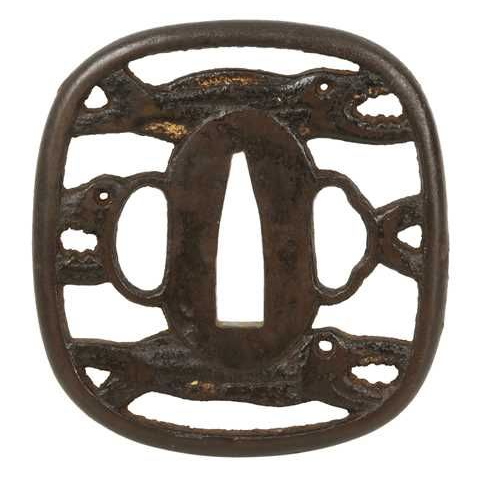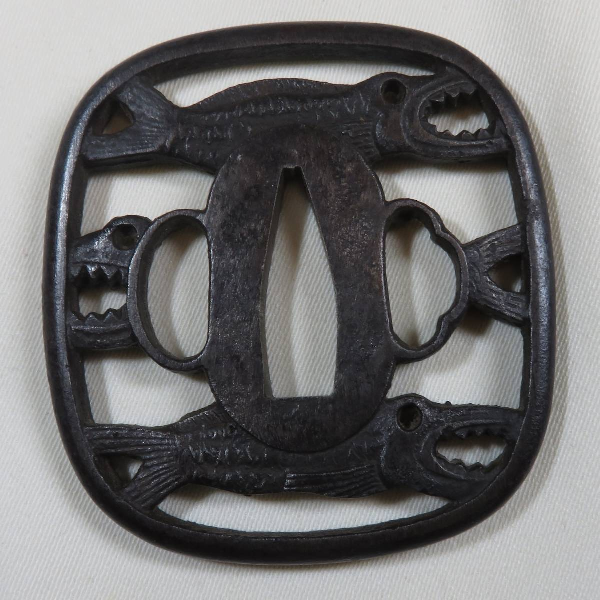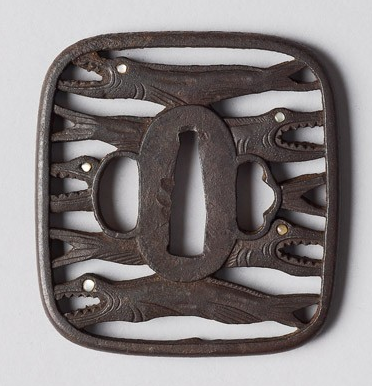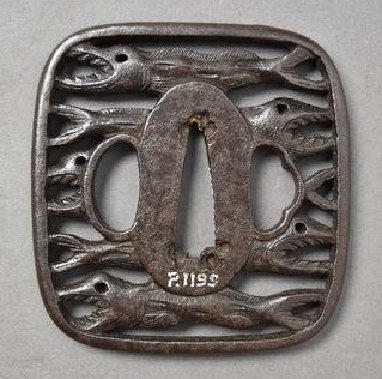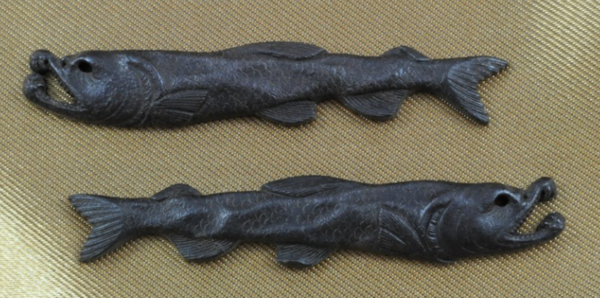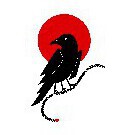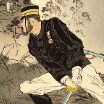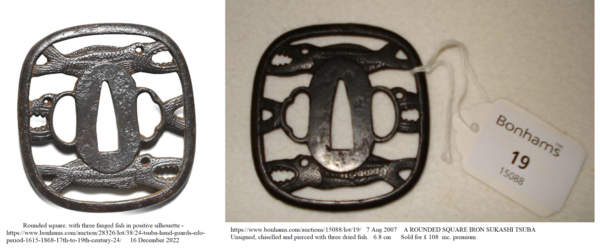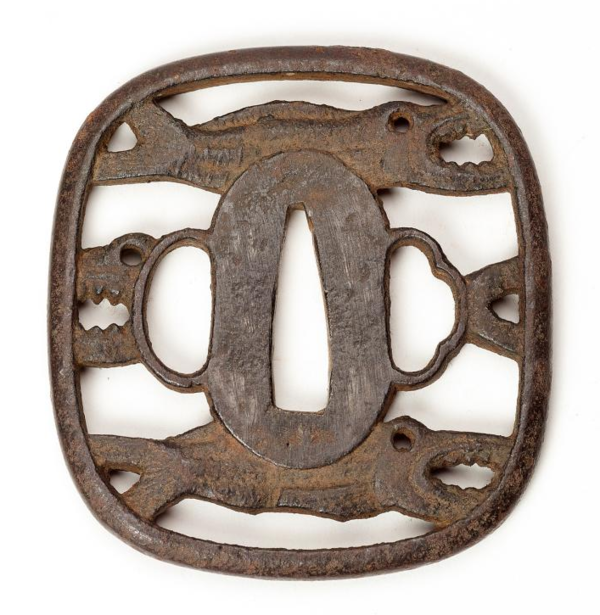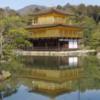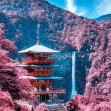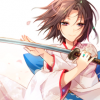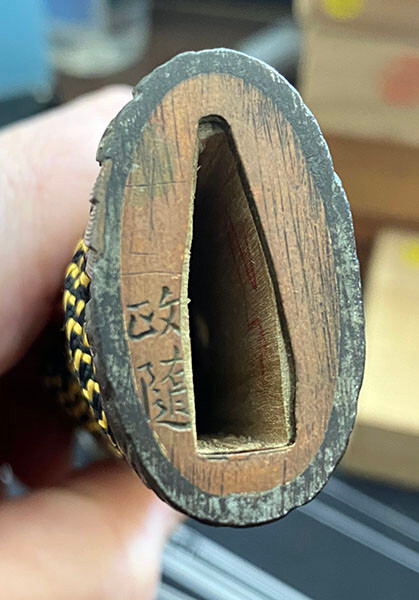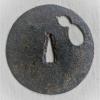Leaderboard
Popular Content
Showing content with the highest reputation on 07/09/2023 in all areas
-
Shin Shinto Satsuma Wakizashi Signed Sesshu Motonaga Dated 1810 This is the widest and thickest Wakizashi I have ever held in hand 4 cm wide. 0.76 cm thick. 45 cm long It's also incredibly heavy , I have put up a normal sized Edo period Wakizashi for comparison. It has Koshirae I haven't received yet. I am looking forward to seeing what it looks like Many thanks to Mike Yamasaki for selling this to me.4 points
-
As Grey points out Yasuchika is a BIG name so the usual caveats apply. Having said that they're pretty tidy work and in fact there do exist a couple, at least, that I am aware of, of solid flat backed menuki bearing his name and papered highly. There were two pairs in fact in the old Tosogu museum, illustrated in the catalogue.4 points
-
Hi Bruce, I also found a RJT star stamped Muto Hidehiro rubbing with KOKI date 2/1943. This has the ko ho marks on mune. (wish I still had that sword - sold it c.1982 and the buyer "polished" it himself - ruined!!!!). Hope this is of use for your records. Regards PS, I just added in the note on Hidehiro - column 3 says he became a RIKUGUN no JUMEI TOSHO in Sho 14/ 6 (June 1939). Not sure about RJT start dates, maybe they mean he started doing work for the Army in that year (a mystery of the RJT scheme for you to solve Bruce - whoohahaha).4 points
-
Hi Brad, welcome to the world of tsuba! This design is reasonably common and I suspect there are both traditionally carved and cast examples getting about in various condition. One here with a bronze/brass fukurin added, but from the large casting bubble on the seppa-dai I would say it too is cast and reworked. https://www.jauce.com/auction/c812486163 or https://buyee.jp/ite...o/auction/c812486163 https://drouot.com/e...-sukashi-en-fer-peri [ended] https://www.ebay.com/itm/285322839100 [ended] Royal Ontario Museum [ROM] https://collections....of-four-dried-salmon it is unfortunate that the museum can't count, there are in fact five fish just like the one in the Ashmolean. And the one you found from the Ashmolean Museum with inlaid eyes - With the few extra fish thrown in! Five examples to get you started, I am sure others will be added. https://nihontofranc...lmon-menuki/?lang=en Menuki pair of dried salmon PS. I will send the ROM a note to let them know the number of fish!4 points
-
Introduction Partnered with the Pop-History image of the Okegawa-clad samurai is the "Hineno" zunari-bachi kabuto, and the two are nearly inseparable. The image of this particular helmet has become representative of the Sengoku-era, and nearly ubiquitous in media. But how far back does this design really go? And how did it evolve? Where did it come from? Further, when did we even start calling this a "zunari"? In this thread I will answer all of the above, and hopefully it will lay much of this to rest. When I have approached this topic with most in the community, it has usually been answered with shrugged shoulders and vagueries. I have never once received a satisfying answer from modern people on this topic; so instead, I went back to the original men of the era. Combing through old documents and viewing as many examples as I could find, a fairly clear chain of events and developments revealed itself. As with the Okegawa thread, I will start with nomenclature and refer heavily to original documents. From then on, I will proceed to show the evolution from the ground up. I'll be writing this one in installments so bare with me. I will not be answering comments or questions until it's finished. Much of this is my own thoughts on the topic, some of which are shared by others in the community, some of which are going to be quite controversial. This will be a bit more detailed than Part 1 was and go into many technical elements. Originally I had planned to save this all for a book, but I don't believe in hiding things behind a pay-wall. I care more about the truth being shared, and the community as a whole becoming something better than it is now.3 points
-
3 points
-
美作国津山ー Mimasaka kuni Tsuyama (cut off) Its the name of a location, but the name of the individual artist has been cut off and lost. The city of Tsuyama in the old province of Mimasaka is located in present-day Okayama Prefecture. The fittings are wartime fittings, but the blade itself is older than the war. Probably by a couple hundred years. As implied above, the sword was once longer than it it is now, and was cut shortened, probably to fit into new fittings (maybe it was shortened to fit it into the wartime fittings).3 points
-
3 points
-
I think it's a zohieto that someone has done some creative acid etching. At first I thought it was Damascus, but you don't see the 'damascus' pattern above the hamon. All Damascus blades I've seen in the past show the pattern all over the blade. The machi line up, not usual for a Chinese blade, and to me, the shape is perfect for a zoheito.3 points
-
Hi Noah, The task at hand, removing the handle to see the sword's tang, might be relatively easy, if you're lucky. but it might be difficult and there is no way for any of us to know which it will be just from the pictures. Explaining how to safely go about an attempt would be too much typing; there are too many variables. If you'd like to call sometime, I'll tell you what I know, talk you through it. I'm not an authority but I've been at this for 40 years and I've removed many difficult handles in that time. Cheers, Grey 218-340-1001 central time.3 points
-
Past auctions with the same tsuba design. https://www.bonhams....-to-19th-century-24/ https://www.bonhams....ctions/15088/lot/19/ https://www.bonhams....uctions/14885/lot/2/ [No image available] A ROUNDED SQUARE IRON SUKASHI TSUBA UNSIGNED, EDO PERIOD Chiselled and pierced with three dried fish 6.8 cm. 4 Apr 2007 Sold for between £ 80 - 120 https://www.invaluab...73fd5232fad4616b3c68 Sold: Galerie Zacke April 01, 2017 Vienna, Austria https://www.invaluab...73fd5232fad4616b3c68 Sold: Galerie Zacke March 22, 2019 Vienna, Austria https://www.invaluab...ccb1affc43c8287e9cfe Unusual 'maru' version described as Akao. https://www.invaluab...ccb1affc43c8287e9cfe described as "toothy fish"3 points
-
I have a sword signed Chikugo no Kuni-jū Mutō Hidehiro dated 1942. The blade has no stamps on it. Im assuming it’s a Gendai. It looks well made from what I can see. It has some markings on the mune of the nakago that I can’t decipher. Does anyone know what these markings mean? Also I didn’t find many examples of Hidehiro’s blades on internet searches.2 points
-
Fyi this year's DTI will only be on Saturday and Sunday not on Friday as in prior years so only the 18th and 19th.2 points
-
Brian wrote: > Anyone want to guess why one pair are signed something else besides Yasuchika? Because there was a whole bunch of them with famous names all made in the same 'workshop'?? It has just come to me that my mate Laurie's were signed SHOZUI but pinked as gimei - this is a some 45 year old memory guys 'n' gals!! I'll have to try and find my paperwork on this - it does exist - somewhere... BaZZa.2 points
-
Hi Brian, Not trying to rain on your parade; I see this as part of all of our learning curve. Another concern I have is the solid construction. Menuki aren't solid because they are worked from the back by repousse' as well as carved on the front. Solid construction precludes work from the back, making finish more difficult, and suggests that the pieces were cast. Are there other menuki with solid backs and authentication (paper)? Grey2 points
-
I would guess for the menuki 安随 (Anzui - not sure of if the first two is in the correct order) 安親 Yasuchika Interestingly the backs of yours look like this set from Aoi depicting Buddha - if your one shows the same? https://www.aoijapan.net/menuki-yasuchika/2 points
-
So this blade could potentially be early 1942. Before or at the very start of the RJT program. Or before he was contracted.2 points
-
The first certificate looks like an old white NBTHK nintensho that got phased out in the 50s I believe Demon motif tsuba Signed Suifu ju Yasutsugu saku Jitetsu mokko gata Sukidashibori 鋤出彫 Nunome zogan2 points
-
The "star" stamp does not appear until mid to late 1942. Anything made prior, will be marked differently.2 points
-
Hi Nicholas, Yes gendaito by a good smith. Muto (Hideyoshi) Hidehiro of Fukuoka. Dated KOKI 2602 year (1942). Born Meiji 24 (1891) died Showa 46 (10 Mar 1971). Regards,2 points
-
1. Yes….a theme often also used in netsuke eg- https://www.bonhams....5-1868-19th-century/2 points
-
1 point
-
This reference may be useful to you https://www.aoijapan...tsuyama-ju-kanesaki/1 point
-
1 point
-
Hi Noah welcome to the forum, glad to see you’re getting good advice for this interesting sword If you’re doing this on your phone (like me!) - One simple way I’ve found to downsize images, is to take a screenshot on your phone of the image you’ve just taken. This will immediately copy the picture you’ve taken and make it a smaller size1 point
-
The last one (Front/Back right?) Front: Awa Nomura school Nihon Tōken Hozon Kai (NTHK) 11 November 2007 Back: Mumei Margu gata Shakudō magaki-chi Nikubori sukashi gold iroe Pheasant and drum End of Edo era1 point
-
1 point
-
1. 後藤光晴 Gotō Mitsuharu 2. 政随 Masayuki (Nara school)(He seems to be popping up a bit lately!) 3. (middle kozuka) 宗永 Munenaga (2 to choose from, one of them being Iwamoto line. The other is Katsura line) 4. (right kozuka) 亀眼 Kigan (Nara school)1 point
-
1st pic 松本一郎 Matsumoto Ichirō 2nd pic 長光道 Naga mitsu michi They are both sort of generic kanji names, put on the sword to give the impression of legitimacy.1 point
-
1 point
-
安親 Yasuchika and 安随 Yasuyuki Both are Nara school names. There are about 9 Yasuchika smiths. Stretching to the end of Edo. Yasuyuki is an end of Edo Nara smith. Gassaku collaboration?1 point
-
Paul , sorry to be the first to comment on this blade , it looks like a Chinese attempt at making a Japanese blade IMHO , the main clue for me is the miss matched Muni-machi and Ha-Machi and the tang finish is poor shape etc.1 point
-
1 point
-
1 point
-
Strange how the world works these days - here is a modern copy [literally made last week], The design taken from a souvenir and not the other way around! https://www.jauce.com/auction/m1098404470 This seller has his own little "factory" producing copies [some very convincing] - he is somewhat stuck with his uniform patination, all his work comes out uniformly glossy black. https://www.jauce.com/user/dj2hmyuc1 point
-
Hello Everyone. I am new to forums and it looks as tho I skipped this step in etiquette. I have already posted in the translation section. I have just inherited my grandfather’s sword that he brought back from the pacific. I am interested in Gendaito and learning from you all. Thanks in advance. Paul1 point
-
Decades ago my old mate Laurie Allen had a pair of near identical menuki with solid backs. I doubt I could find photos, but I do remember they were signed SHOZUI. The memory is faint, but I think he submitted them for papers. Again, I probably have a copy of the paper 'somewhere', but it would take me a week of looking and even then not find them. BaZZa.1 point
-
My vote is real mounts and fake blade. The kissaki is wrong and the bo hi end strangely. The hamon and hada are weird. Grey1 point
-
I believe the fuchi is Okamoto Genbeijo Naoshige.1 point
-
Juyo Naoe Shizu Tachi from early Nanbokucho jidai 69.8 cm I Suriage Achieved Juyo status in 1967 Tachi Koshirae papered by NPO as Edo period Hi on both sides My photos don't do it justice , the light just wasn't right Many thanks to Mike Yamasaki for selling this to me . I really appreciate the quality of this Tachi.1 point
-
They are the "KO" of the Kokura Army Arsenal Supervisory Section and the "HO" of the 1st Factory of the Kokura Army Arsenal.1 point
-
Hi Noah, I agree with Brian. This needs to be seen by someone who knows Japanese swords before you'll have a better idea what you have. Maybe the handle can come off without cutting into the string maybe not, but it needs someone with experience to attempt it. In the mean time, don't try to fix anything yourself; well meaning amateurs often do damage. Here is a care and cleaning brochure that will tell you more: https://nbthk-ab2.or...ord-characteristics/ Grey1 point
-
1 point
-
Brad, this might indeed be the "dried salmon" theme. It looks like a cast copy of a TSUBA (not typical AKAO school) in badly corroded and damaged condition. I hope you did not pay for it. I am optimistic that you could find authentic TSUBA with that subject.1 point
-
1 point
-
Saya is strange to me. Looks to have a koiguchi of sorts? The haikan looks to be the kind that are usually found under leather combat covers(picture attached) so not sure what the zip ties are accomplishing?? The Semegane looks iron and is not one I'd associate with gunto mounts(there are exceptions usually on higher class ones) The ishizuke seems like a weird addition as well if it had a combat cover originally. Also, has 3 seppa for sure, maybe 4. An odd amount for something like this. I'm usually skeptical of people who sell several WWII mounted blades(If wanting it to be all original is a big deal for you) I would price it on the blade(which I like) more than the mounts. Just my 2 cents.1 point
-
Dang! I noticed the bulky-ness at the bottom, but was focusing on other stuff, and didn't pursue. Steve - @Swords - if these are zip ties, what is the structure of the hanger ring above, that they are holding onto???1 point
-
1 point
-
I think we can only guess at its significance. Jizō is nowadays associated most closely with children, but I don't think it was always the case. I think in general, Jizō is in charge of wandering the earth and making sure dead souls get out of Buddhist hell. So I can see how a warrior might want to invoke that spirit.1 point
-
1 point
This leaderboard is set to Johannesburg/GMT+02:00





